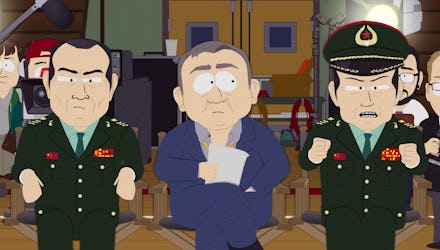South Park trolled China, so China scrubbed all traces of the show from the internet

After airing an episode called “Band in China,” South Park has been, well, banned in China.
The most recent episode of the long-running, foul-mouthed animated comedy took a number of shots at the nation currently embroiled in a number of controversies. In the episode, Stan, Jimmy, Kenny and Butters form a metal band, which rockets to stardom, prompting a movie deal. But the script is tightly-monitored so it can be distributed in China.
"Now I know how Hollywood writers feel," Stan says, as a censor oversees his work and makes edits. The storyline also lampoons Disney, with Mickey Mouse arriving to ensure that his employees — other cartoon Disney characters and superheroes from the MCU — behave under the watchful eye of Chinese authorities.
In another thread of the episode, Randy gets caught selling weed in the People’s Republic and is sent to a work camp — meant to evoke the real-life “re-education camps” used to imprison Chinese Muslims and other ethnic minorities in Xinjiang Province. The detention centers are used to indoctrinate Muslims into “a disciplined, Chinese-speaking industrial workforce, loyal to the Communist Party and factory bosses,” according to official plans published online, as reported by the New York Times.
In the South Park episode, Randy runs into Winnie the Pooh in his work camp. The beloved cartoon bear was exiled from Chinese media in 2017 for becoming a symbol of the resistance. Bloggers wrote that the pudgy, honey-loving Pooh resembled Chinese leader Xi Jinping, prompting censors to block Winnie the Pooh pictures on social media and refuse to release the film Christopher Robin in China. John Oliver mocked the whole kerfuffle on Last Week Tonight, which in turn prompted Chinese authorities to block HBO in the nation.
After “Band in China” aired, government censors quickly and aggressively scrubbed every trace of South Park from the Chinese internet, according to The Hollywood Reporter. Gone was every single mention of the show from the Twitter-like social media site Weibo. Links to every clip, episode, and full season of South Park on streaming service Youku, owned by Alibaba, were dead. Each thread and subthread about the show on Baidu’s Tieba, China’s Reddit-esque discussion platform, had evaporated. If visitors manually typed in the URL for what used to be a South Park forum, they got a message stating, “According to the relevant law and regulation, this section is temporarily not open.”
Parker and Stone, the masterminds behind South Park and the Tony Award-winning musical The Book of Mormon, are used to poking the bear (pun intended). In fact, they seem to revel in it. On Monday, they tweeted a faux apology to Chinese authorities.
"Like the NBA, we welcome the Chinese censors into our homes and into our hearts," the statement read. "We too love money more than freedom and democracy. Xi doesn't look just like Winnie the Pooh at all. Tune into our 300th episode this Wednesday at 10! Long live the great Communist Party of China. May the autumn's sorghum harvest be bountiful. We good now China?"
The South Park creators are, of course, referencing the other pop culture controversy unfolding this week involving China and the NBA. On Sunday, Daryl Morey, general manager of the Houston Rockets, tweeted (then deleted) his support for pro-democracy protesters in Hong Kong. Rockets owner Tilman Fertitta, in turn, tweeted that Morey did not speak for the team, as complaints from Chinese sponsors poured in and Chinese media refused to broadcast Houston games.
On Tuesday, NBA Commissioner Adam Silver defended Morey’s right to free speech, however. “Values of equality, respect and freedom of expression have long defined the NBA — and will continue to do so,” he said in a statement. “It is inevitable that people around the world — including from America and China — will have different viewpoints over different issues. It is not the role of the NBA to adjudicate those differences. [...] We simply could not operate that way.” The state-run television network CCTV responded by suspending the broadcast of all NBA preseason games in China.
The NBA dispute and the South Park outrage highlights a confounding paradox for US companies. China represents the world’s second-largest economy. Alienating the Chinese market represents a critical threat to business. But the US entertainment industry, which ostensibly acts as the face of democratic values overseas, faces a moral dilemma: play ball with censors and tap in to a wildly lucrative market, or uphold ethical ideals and risk getting erased in parts of the world.